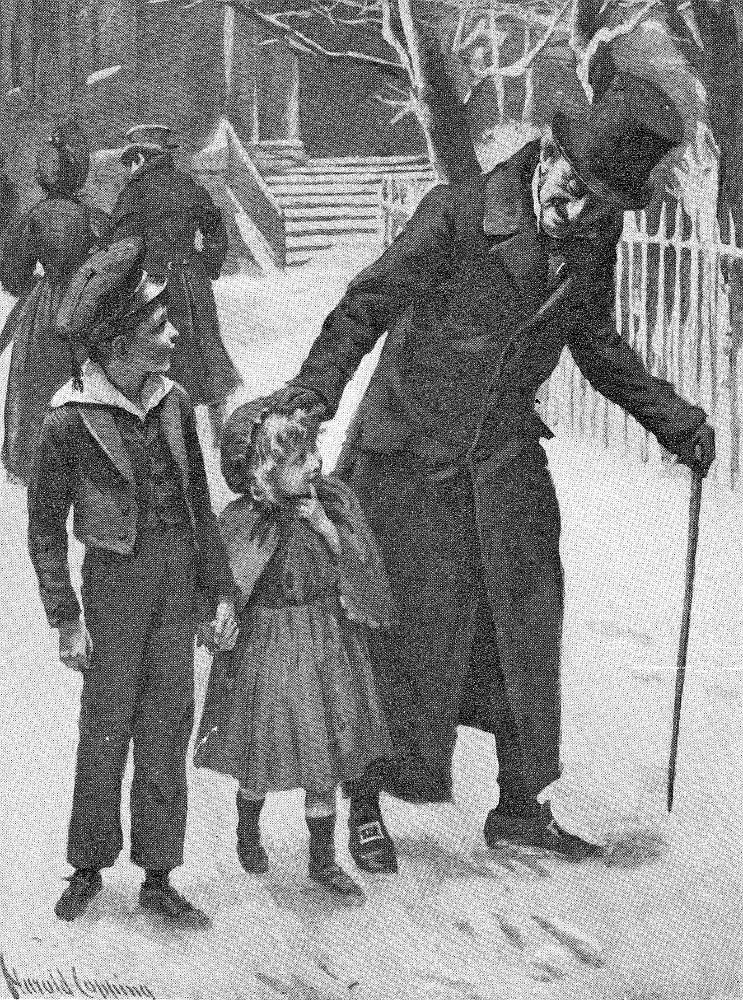

Ebenezer Scrooge on Christmas morning in the street: Ebenezer Scrooge with two children (1924) and He went to church, and walked about the streets, and watched the people hurrying to-and-fro, and patted children on the head (1911, facing p. 124) — Harold Copping's twin studies of the social reintegration of the former miser and general curmudgeon in A Christmas Carol and subsequently Children's Stories from Dickens. Colour lithography and black-and-white lithography. Left: 4 ⅞ by 3 ½ inches (12.5 x 9 cm), framed. Right: 6 by 4 ⅜ inches (15.1 x 11.3 cm), framed. [Click on images to enlarge them.]
Passage Illustrated: Scrooge reintegrated with Humanity
He dressed himself "all in his best," and at last got out into the streets. The people were by this time pouring forth, as he had seen them with the Ghost of Christmas Present; and, walking with his hands behind him, Scrooge regarded every one with a delighted smile. He looked so irresistibly pleasant, in a word, that three or four good-humoured fellows said, "Good morning, sir! A merry Christmas to you!" And Scrooge said often afterwards that, of all the blithe sounds he had ever heard, those were the blithest in his ears. ["Stave Five: The End of It," A Christmas Carol, 123]
Further Illustrations of the Conclusion of the Novella, 1843-1924



Left: Furniss's The Last of the Spirits (1910). Centre: Arthur Rackham shows what Scrooge has missed by never having had his own family: A flushed and boisterous group (1915). Right: John Leech's tailpiece in the original edition shows a new relationship between Master and man: Scrooge and Bob Cratchit, or, The Christmas Bowl (1843). [Click on the images to enlarge them.]



Left: Charles Green's tailpiece: Scrooge and Bob Cratchit (lithograph, 1912). Centre: Sol Eytinge, Jr.'s conclusion in the Diamond Edition: "I'll raise your salary (1868). Right: Copping's own Scrooge and the Poulterer's Man in Children's Stories from Dickens, p. 54 (1893).


Two concluding illustrations from the American and British Household Editions of scenes indicative of Scrooge's redemption: Left: Fred Barnard's "What do you call this?" said Joe. "Bed-curtains?" ("Stave Four," 1878). Right: E. A. Abbey's "It's I. Your Uncle Scrooge . . . . ." ("Stave Five," 1876). [Click on each image to enlarge it.]
Illustrations for A Christmas Carol (1843-1915)
- John Leech's original 1843 series of eight engravings for Dickens's A Christmas Carol
- Sol Eytinge, Junior's 1867-68 illustrations for two Ticknor & Fields editions for Dickens's A Christmas Carol
- E. A. Abbey's 1876 illustrations for The American Household Edition of Dickens's Christmas Books
- Fred Barnard's 1878 illustrations for The Household Edition of Dickens's Christmas Books
- Charles E. Brock's 1905 illustrations for A Christmas Carol and The Chimes
- A. A. Dixon's 1906 Collins Pocket Edition for Dickens's Christmas Books
- Harry Furniss's 1910 Charles Dickens Library Edition of Dickens's Christmas Books
- A selection of Arthur Rackham's 1915 illustrations for Dickens's A Christmas Carol
Scanned image and text by Philip V. Allingham. [You may use these images without prior permission for any scholarly or educational purpose as long as you (1) credit the photographer and (2) link your document to this URL in a web document or cite the Victorian Web in a print one.]
Bibliography
Dickens, Charles. A Christmas Carol in Prose, Being A Ghost Story for Christmas. Illustrated by John Leech. London: Chapman & Hall, 1843.
Dickens, Charles. A Christmas Carol. Illustrated by Harold Copping. London, Paris, New, York: Raphael Tuck, 1911.
Dickens, Charles. A Christmas Carol. Illustrated by Charles Green, R. I. London: A & F Pears, 1912.
Dickens, Mary Angela, Percy Fitzgerald, Captain Edric Vredenburg, and Others. Illustrated by Harold Copping with eleven coloured lithographs. Children's Stories from Dickens. London: Raphael Tuck, 1893.
Dickens, Mary Angela [Charles Dickens' grand-daughter]. Dickens' Dream Children. London, Paris, New York: Raphael Tuck & Sons, Ltd., 1924.
Hearne, Michael Patrick, ed. The Annotated Christmas Carol. New York: Avenel, 1989.
Matz, B. W., and Kate Perugini; illustrated by Harold Copping. Character Sketches from Dickens. London: Raphael Tuck, 1924. Copy in the Paterson Library, Lakehead University, Thunder Bay, Ontario, Canada.
Slater, Michael. "Notes to A Christmas Carol. The Christmas Books. 2 vols. Harmondsworth: Penguin, 1971. Rpt. 1978. Vol. 1, pp. 257-261.
Simons, Paul, and Will Pavia. "Dreaming of a white Christmas? Put it down to Dickens's nostalgia for his lost childhood." The Times. 24 December 2008. Page 4.
Created 5 October 2023